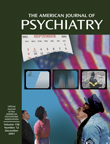To the Editor: The care that physicians provide to terminally ill and end-stage patients has received growing attention. Numerous specialty boards and organizations, including the Academy of Psychosomatic Medicine, have developed professional standards on end-of-life care for their members
(1–
3). Although there are several reasons for less than adequate end-of-life care, insufficient training of clinicians in this area is a major concern
(4).
The textbooks used to train clinicians deserve their fair share of the blame. Our research
(5) has identified major deficiencies in the end-of-life content of 50 best-selling medical textbooks, including three top psychiatry textbooks.
At first glance, these three textbooks may be praised for scoring significantly higher than other specialty texts. As a group, these textbooks contained helpful information (mean=34.4% of their content) regarding end-of-life care. The textbook with the highest overall score for helpful end-of-life content (44.2%) was a psychiatry textbook. Unfortunately, these figures are praiseworthy only when compared to the paucity of information in texts from other specialties. On their own, these scores call for drastic changes in content.
In the face of such alarming findings, we have led an effort to encourage publishers, editors, and authors to improve their textbooks’ content on end-of-life care, including book chapters, cross-referencing, and indexing
(6). In following up this effort, we recently surveyed textbook publishers and editors to assess their progress in revising their texts.
We have been encouraged by a very positive response overall. To date, we have received responses to our follow-up survey from 19 publishers and 23 editors (including two of three editors of the psychiatry texts) of the 50 textbooks surveyed. These responses indicate plans to expand the end-of-life care content in the next editions of 22 textbooks, including 17 textbooks with new chapters regarding end-of-life care, 11 with expanded cross-referencing, and 17 with revised indexes. Hence, of the 50 textbooks, over one-third are expanding the end-of-life care content in their next editions. Finally, we have received six personal letters of support from editors and publishers, including a poignant one from an editor who was dying of metastatic melanoma when he wrote to us.
Recently, the Robert Wood Johnson Foundation honored textbook authors, editors, and publishers who have undertaken significant efforts toward making important changes. On Feb. 21, 2001, the Last Acts Project held an awards ceremony for the occasion. The foundation presented awards to the editors of three medical textbooks (Emergency Medicine, 5th ed., editor-in-chief, Judith Tintinalli; Nelson Textbook of Pediatrics, 16th ed., editors, Richard Behrman, Robert Kliegman, and Hal Jensen; and Textbook of Primary Care Medicine, 3rd ed., senior editor, John Noble) and to one medical textbook publisher (Lippincott Williams & Wilkins).
It is unfortunate that there is still much work to be done. Many best-selling textbooks have not yet responded to the suggestions of their specialty boards, the needs of their readers, or the demands of patients and families to improve clinician education in the care of patients at the end of life. We will continue monitoring textbooks over the next several years, and the Robert Wood Johnson Foundation will continue to offer awards to the publishers, editors, and authors who improve the end-of-life content in their books. It is of the utmost importance that current knowledge and ongoing research in palliative care published in this journal quickly find its way into best-selling psychiatry textbooks.

